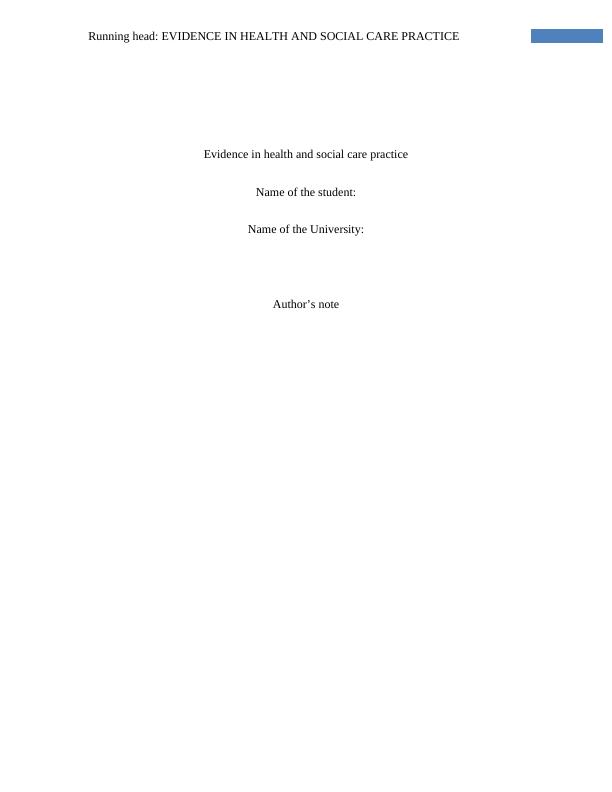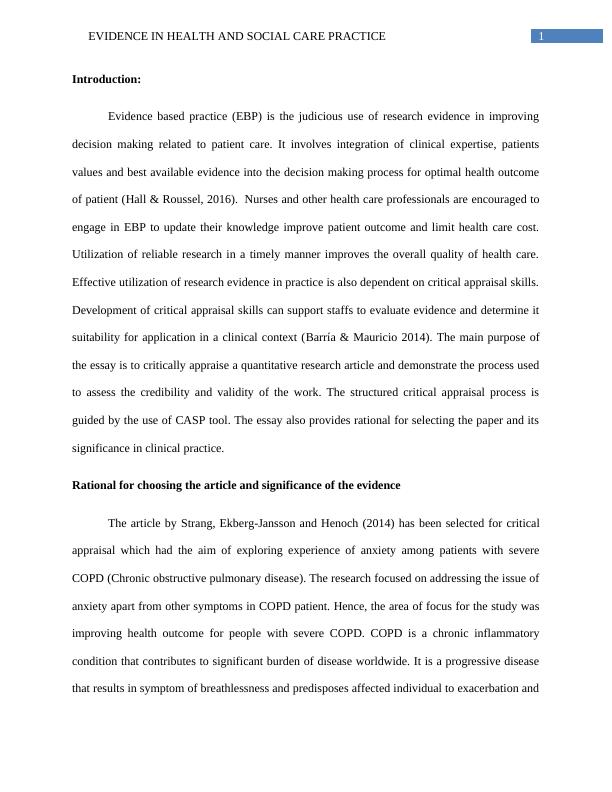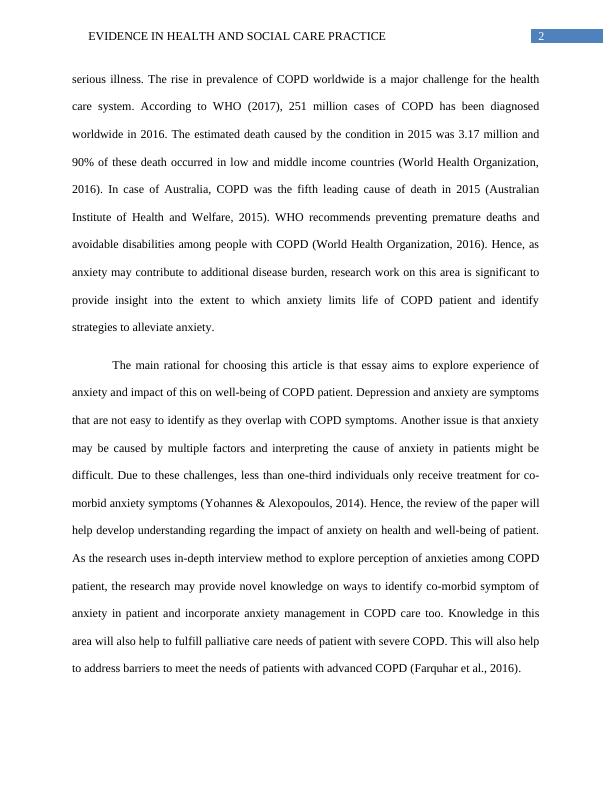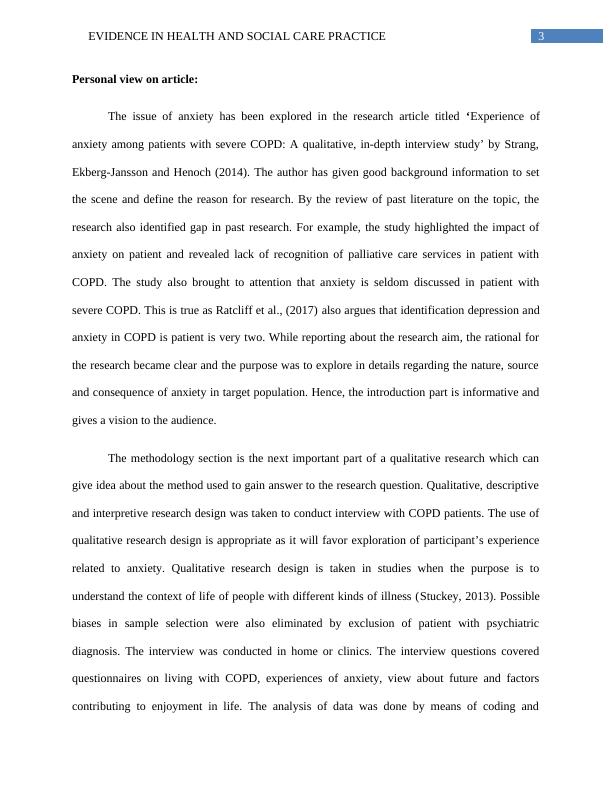Evidence in Health and Social Care Practice
Added on 2023-06-11
15 Pages4444 Words423 Views
Running head: EVIDENCE IN HEALTH AND SOCIAL CARE PRACTICE
Evidence in health and social care practice
Name of the student:
Name of the University:
Author’s note
Evidence in health and social care practice
Name of the student:
Name of the University:
Author’s note

1EVIDENCE IN HEALTH AND SOCIAL CARE PRACTICE
Introduction:
Evidence based practice (EBP) is the judicious use of research evidence in improving
decision making related to patient care. It involves integration of clinical expertise, patients
values and best available evidence into the decision making process for optimal health outcome
of patient (Hall & Roussel, 2016). Nurses and other health care professionals are encouraged to
engage in EBP to update their knowledge improve patient outcome and limit health care cost.
Utilization of reliable research in a timely manner improves the overall quality of health care.
Effective utilization of research evidence in practice is also dependent on critical appraisal skills.
Development of critical appraisal skills can support staffs to evaluate evidence and determine it
suitability for application in a clinical context (Barría & Mauricio 2014). The main purpose of
the essay is to critically appraise a quantitative research article and demonstrate the process used
to assess the credibility and validity of the work. The structured critical appraisal process is
guided by the use of CASP tool. The essay also provides rational for selecting the paper and its
significance in clinical practice.
Rational for choosing the article and significance of the evidence
The article by Strang, Ekberg-Jansson and Henoch (2014) has been selected for critical
appraisal which had the aim of exploring experience of anxiety among patients with severe
COPD (Chronic obstructive pulmonary disease). The research focused on addressing the issue of
anxiety apart from other symptoms in COPD patient. Hence, the area of focus for the study was
improving health outcome for people with severe COPD. COPD is a chronic inflammatory
condition that contributes to significant burden of disease worldwide. It is a progressive disease
that results in symptom of breathlessness and predisposes affected individual to exacerbation and
Introduction:
Evidence based practice (EBP) is the judicious use of research evidence in improving
decision making related to patient care. It involves integration of clinical expertise, patients
values and best available evidence into the decision making process for optimal health outcome
of patient (Hall & Roussel, 2016). Nurses and other health care professionals are encouraged to
engage in EBP to update their knowledge improve patient outcome and limit health care cost.
Utilization of reliable research in a timely manner improves the overall quality of health care.
Effective utilization of research evidence in practice is also dependent on critical appraisal skills.
Development of critical appraisal skills can support staffs to evaluate evidence and determine it
suitability for application in a clinical context (Barría & Mauricio 2014). The main purpose of
the essay is to critically appraise a quantitative research article and demonstrate the process used
to assess the credibility and validity of the work. The structured critical appraisal process is
guided by the use of CASP tool. The essay also provides rational for selecting the paper and its
significance in clinical practice.
Rational for choosing the article and significance of the evidence
The article by Strang, Ekberg-Jansson and Henoch (2014) has been selected for critical
appraisal which had the aim of exploring experience of anxiety among patients with severe
COPD (Chronic obstructive pulmonary disease). The research focused on addressing the issue of
anxiety apart from other symptoms in COPD patient. Hence, the area of focus for the study was
improving health outcome for people with severe COPD. COPD is a chronic inflammatory
condition that contributes to significant burden of disease worldwide. It is a progressive disease
that results in symptom of breathlessness and predisposes affected individual to exacerbation and

2EVIDENCE IN HEALTH AND SOCIAL CARE PRACTICE
serious illness. The rise in prevalence of COPD worldwide is a major challenge for the health
care system. According to WHO (2017), 251 million cases of COPD has been diagnosed
worldwide in 2016. The estimated death caused by the condition in 2015 was 3.17 million and
90% of these death occurred in low and middle income countries (World Health Organization,
2016). In case of Australia, COPD was the fifth leading cause of death in 2015 (Australian
Institute of Health and Welfare, 2015). WHO recommends preventing premature deaths and
avoidable disabilities among people with COPD (World Health Organization, 2016). Hence, as
anxiety may contribute to additional disease burden, research work on this area is significant to
provide insight into the extent to which anxiety limits life of COPD patient and identify
strategies to alleviate anxiety.
The main rational for choosing this article is that essay aims to explore experience of
anxiety and impact of this on well-being of COPD patient. Depression and anxiety are symptoms
that are not easy to identify as they overlap with COPD symptoms. Another issue is that anxiety
may be caused by multiple factors and interpreting the cause of anxiety in patients might be
difficult. Due to these challenges, less than one-third individuals only receive treatment for co-
morbid anxiety symptoms (Yohannes & Alexopoulos, 2014). Hence, the review of the paper will
help develop understanding regarding the impact of anxiety on health and well-being of patient.
As the research uses in-depth interview method to explore perception of anxieties among COPD
patient, the research may provide novel knowledge on ways to identify co-morbid symptom of
anxiety in patient and incorporate anxiety management in COPD care too. Knowledge in this
area will also help to fulfill palliative care needs of patient with severe COPD. This will also help
to address barriers to meet the needs of patients with advanced COPD (Farquhar et al., 2016).
serious illness. The rise in prevalence of COPD worldwide is a major challenge for the health
care system. According to WHO (2017), 251 million cases of COPD has been diagnosed
worldwide in 2016. The estimated death caused by the condition in 2015 was 3.17 million and
90% of these death occurred in low and middle income countries (World Health Organization,
2016). In case of Australia, COPD was the fifth leading cause of death in 2015 (Australian
Institute of Health and Welfare, 2015). WHO recommends preventing premature deaths and
avoidable disabilities among people with COPD (World Health Organization, 2016). Hence, as
anxiety may contribute to additional disease burden, research work on this area is significant to
provide insight into the extent to which anxiety limits life of COPD patient and identify
strategies to alleviate anxiety.
The main rational for choosing this article is that essay aims to explore experience of
anxiety and impact of this on well-being of COPD patient. Depression and anxiety are symptoms
that are not easy to identify as they overlap with COPD symptoms. Another issue is that anxiety
may be caused by multiple factors and interpreting the cause of anxiety in patients might be
difficult. Due to these challenges, less than one-third individuals only receive treatment for co-
morbid anxiety symptoms (Yohannes & Alexopoulos, 2014). Hence, the review of the paper will
help develop understanding regarding the impact of anxiety on health and well-being of patient.
As the research uses in-depth interview method to explore perception of anxieties among COPD
patient, the research may provide novel knowledge on ways to identify co-morbid symptom of
anxiety in patient and incorporate anxiety management in COPD care too. Knowledge in this
area will also help to fulfill palliative care needs of patient with severe COPD. This will also help
to address barriers to meet the needs of patients with advanced COPD (Farquhar et al., 2016).

3EVIDENCE IN HEALTH AND SOCIAL CARE PRACTICE
Personal view on article:
The issue of anxiety has been explored in the research article titled ‘Experience of
anxiety among patients with severe COPD: A qualitative, in-depth interview study’ by Strang,
Ekberg-Jansson and Henoch (2014). The author has given good background information to set
the scene and define the reason for research. By the review of past literature on the topic, the
research also identified gap in past research. For example, the study highlighted the impact of
anxiety on patient and revealed lack of recognition of palliative care services in patient with
COPD. The study also brought to attention that anxiety is seldom discussed in patient with
severe COPD. This is true as Ratcliff et al., (2017) also argues that identification depression and
anxiety in COPD is patient is very two. While reporting about the research aim, the rational for
the research became clear and the purpose was to explore in details regarding the nature, source
and consequence of anxiety in target population. Hence, the introduction part is informative and
gives a vision to the audience.
The methodology section is the next important part of a qualitative research which can
give idea about the method used to gain answer to the research question. Qualitative, descriptive
and interpretive research design was taken to conduct interview with COPD patients. The use of
qualitative research design is appropriate as it will favor exploration of participant’s experience
related to anxiety. Qualitative research design is taken in studies when the purpose is to
understand the context of life of people with different kinds of illness (Stuckey, 2013). Possible
biases in sample selection were also eliminated by exclusion of patient with psychiatric
diagnosis. The interview was conducted in home or clinics. The interview questions covered
questionnaires on living with COPD, experiences of anxiety, view about future and factors
contributing to enjoyment in life. The analysis of data was done by means of coding and
Personal view on article:
The issue of anxiety has been explored in the research article titled ‘Experience of
anxiety among patients with severe COPD: A qualitative, in-depth interview study’ by Strang,
Ekberg-Jansson and Henoch (2014). The author has given good background information to set
the scene and define the reason for research. By the review of past literature on the topic, the
research also identified gap in past research. For example, the study highlighted the impact of
anxiety on patient and revealed lack of recognition of palliative care services in patient with
COPD. The study also brought to attention that anxiety is seldom discussed in patient with
severe COPD. This is true as Ratcliff et al., (2017) also argues that identification depression and
anxiety in COPD is patient is very two. While reporting about the research aim, the rational for
the research became clear and the purpose was to explore in details regarding the nature, source
and consequence of anxiety in target population. Hence, the introduction part is informative and
gives a vision to the audience.
The methodology section is the next important part of a qualitative research which can
give idea about the method used to gain answer to the research question. Qualitative, descriptive
and interpretive research design was taken to conduct interview with COPD patients. The use of
qualitative research design is appropriate as it will favor exploration of participant’s experience
related to anxiety. Qualitative research design is taken in studies when the purpose is to
understand the context of life of people with different kinds of illness (Stuckey, 2013). Possible
biases in sample selection were also eliminated by exclusion of patient with psychiatric
diagnosis. The interview was conducted in home or clinics. The interview questions covered
questionnaires on living with COPD, experiences of anxiety, view about future and factors
contributing to enjoyment in life. The analysis of data was done by means of coding and

End of preview
Want to access all the pages? Upload your documents or become a member.
Related Documents
Critical Review Assignment 2022lg...
|18
|4044
|50
Challenges to Implementing Evidence Based Care in Mental Health Practicelg...
|14
|3427
|421
COPD Education and Cognitive Behavioural Therapylg...
|18
|4798
|43
Foundations of Evidence for Nursing Practicelg...
|7
|1464
|35
Effectiveness of Cognitive Behavioural Therapy in Treating Mental Health Patients with Depressionlg...
|11
|3079
|72
Preventing Ventilator Associated Pneumonia in ICU: Evidence Based Practicelg...
|6
|1452
|165
